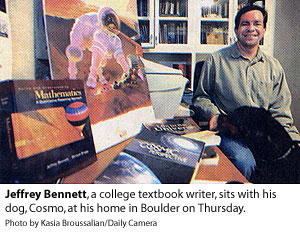 The Daily Camera
The Daily Camera
Author: Todd Neff – Camera Staff Writer
The John Grisham of astronomy textbooks lives in north Boulder.
Jeffrey Bennett, a University of Colorado-trained astrophysicist and longtime instructor there, is known locally for his children’s books “Max Goes to the Moon” and “Max Goes to Mars.”
But these well-regarded, Rottweiler-centric efforts were sidelights for the man who recently finished yet another edition of the most popular college astronomy textbook in the United States.
“The Cosmic Perspective,” Bennett’s bestseller – publisher Addison-Wesley estimates that as many as one in three introductory astronomy classes in America use it – has been a team effort.
It was written with CU planetary scientist Nick Schneider and the husband-and-wife team of Megan Donahue and Mark Voit, both professors at Michigan State University.
In addition to being an expert on stars and galaxies, Donahue was a housemate of Bennett’s in graduate school. Voit earned his Ph.D. at CU in 1990.
The book is a colorful, sweeping volume of about 800 pages, touching upon ! Stonehenge, stellar formation and spectroscopy, among countless other topics. The fourth edition, published in December, is roughly the size of a slim notebook computer and sells for $103 on Amazon.com.
Doug Duncan, director of CU’s astronomical laboratories, teaches introductory astronomy classes of about 200 students and uses “The Cosmic Perspective” as his course’s primary text.
Duncan said Bennett’s ability to communicate and the combined expertise of his co-authors were big factors in his choice. But what sets the book apart are dozens of online tutorials covering topics such as Kepler’s laws of motion and black holes.
“It’s a bit like having your private little tutor,” he said.
Because the system – part of the publisher’s roughly $1 million online investment including movies, interactive graphics and flash cards – can record answers, it acts as a proxy for homework assignments, and Duncan said students prefer it.
Bennett’s life as a textbook author began in the late 1980s, when, as a fresh Ph.D., he volunteered to teach a CU class to boost math skills of non-science majors. He realized only after the fact that no textbook existed for the material.
A series of 100-hour weeks led to a 400-page stack of notes that eventually became his first textbook, “Using and Understanding Mathematics: A Quantitative Reasoning Approach,” co-authored with William Briggs, a CU-Denver math professor.
Other textbooks followed. He often juggles multiple books at a time in the office of his north Boulder home. New ones take him about 2,000 hours, he says, or roughly a standard work year. Revisions require about half that.
It often means working long after his son, Grant, 7, and daughter, Brooke, 4, have gone to bed. He stopped teaching classes at CU three or four years ago.
“It’s nuts,” he said.
His wife, Lisa, also is at home, as is Cosmo, a Rottweiler pup that arrived after Max died in late 2004.
Adam Black, editor-in-chief of physical sciences at Addison Wesley! /Benjamin Cummings, described Bennett as “incredibly passionate about teaching, and his biggest care is about helping students.”
“I meet maybe 500 new professors on campus each year, and they’re all interesting people,” Black said. “But finding someone like Jeff, who can do what he can do with textbooks, he’s like gold dust.”
Copyright, 2006, The Daily Camera, Boulder, Colo.>
